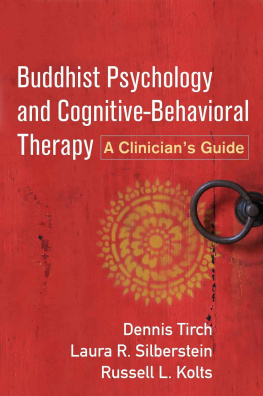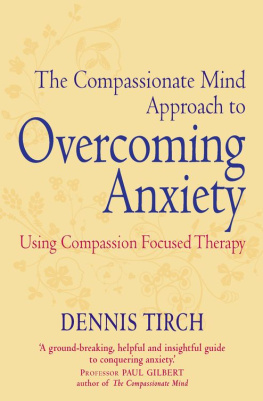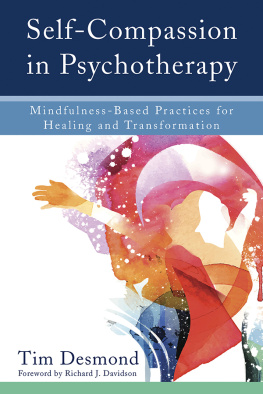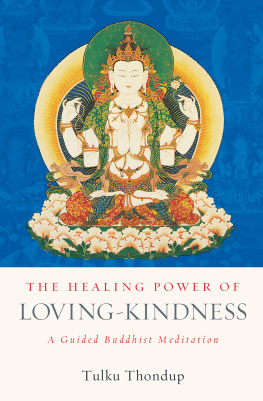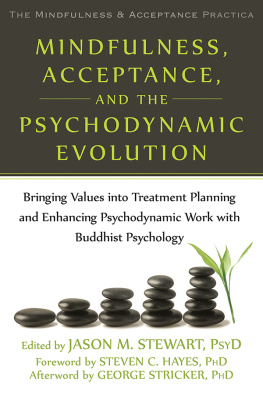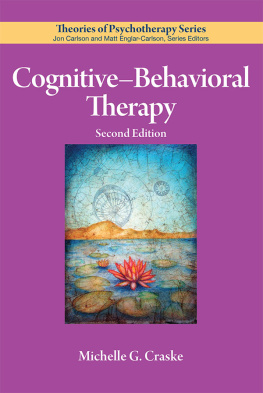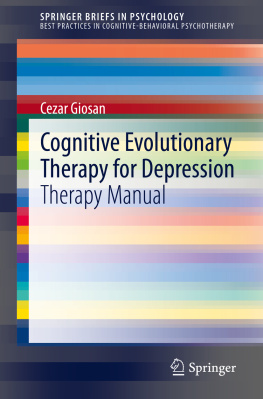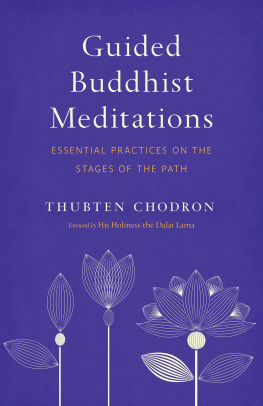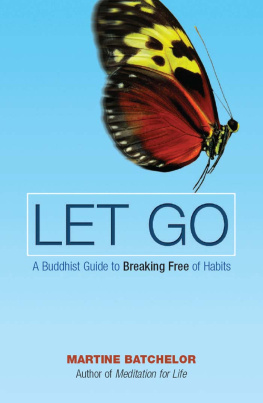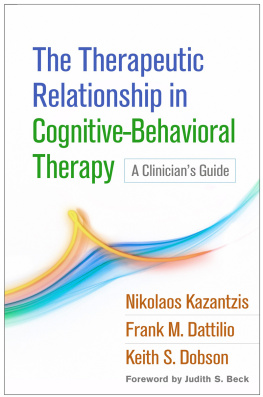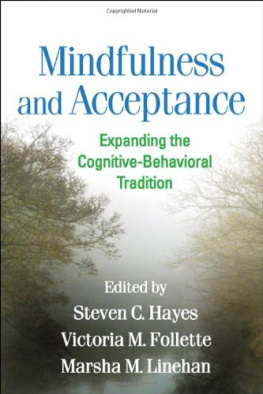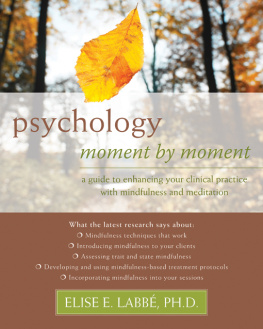Emotion Regulation in Psychotherapy:
A Practitioners Guide
Robert L. Leahy, Dennis Tirch, and Lisa A. Napolitano
Buddhist Psychology
and Cognitive-Behavioral
Therapy A Clinicians Guide

Dennis Tirch
Laura R. Silberstein
Russell L. Kolts
Foreword by Robert L. Leahy

T HE G UILFORD P RESS
New York London
Epub Edition ISBN: 9781462523269; Kindle Edition ISBN: 9781462523276
2016 The Guilford Press
A Division of Guilford Publications, Inc.
370 Seventh Avenue, Suite 1200, New York, NY 10001
www.guilford.com
All rights reserved
No part of this book may be reproduced, translated, stored in a retrieval system, or transmitted, in any form or by any means, electronic, mechanical, photocopying, microfilming, recording, or otherwise, without written permission from the publisher.
Last digit is print number: 9 8 7 6 5 4 3 2 1
The authors have checked with sources believed to be reliable in their efforts to provide information that is complete and generally in accord with the standards of practice that are accepted at the time of publication. However, in view of the possibility of human error or changes in behavioral, mental health, or medical sciences, neither the authors, nor the editors and publisher, nor any other party who has been involved in the preparation or publication of this work warrants that the information contained herein is in every respect accurate or complete, and they are not responsible for any errors or omissions or the results obtained from the use of such information. Readers are encouraged to confirm the information contained in this book with other sources.
Library of Congress Cataloging-in-Publication Data
Tirch, Dennis D., 1968
Buddhist psychology and cognitive-behavioral therapy : a clinicians guide / Dennis Tirch, Laura R. Silberstein, Russell L. Kolts.
pages cm
Includes bibliographical references and index.
ISBN 978-1-4625-2324-5 (hardcover)
1. BuddhismPsychology. 2. Mindfulness-based cognitive therapy. I. Title.
BQ4570.P76 T57b2016
294.3'3615dc23
2015013307
To all of my clients, and to the Three Wise Men
John Tirch, Philip Inwood, and Jeff Peretz
D. T.
To two Bodhisattvas who happen to be my parents,
Kathy and Stuart Silberstein
L. R. S.
To Adrienne Isgrigg, whose courageous questions
started me on the path that led me here,
and to Lama Inga Sandvoss, who stewarded me
along the initial part of the journey
R. L. K.
Dennis Tirch, PhD, is Director of the Center for Compassion Focused Therapy in New York City and Clinical Assistant Professor in the Department of Psychiatry at Weill Cornell Medical College. He is an associate editor of the Journal of Contextual Behavioral Science and president of the Compassionate Mind Foundation USA, which is committed to research and training in compassion-focused therapy (CFT). Dr. Tirch serves as president of the New York City Cognitive Behavioral Therapy (CBT) Association and president emeritus of the New York City chapter of the Association for Contextual Behavioral Science (ACBS), and is a Diplomate and Fellow of the Academy of Cognitive Therapy. He provides training internationally for clinicians and researchers and is the author of numerous books, chapters, and peer-reviewed articles on CBT, CFT, acceptance and commitment therapy (ACT), and Buddhist psychology principles.
Laura R. Silberstein, PsyD, is Associate Director of the Center for Compassion Focused Therapy and a consulting psychologist at Memorial Sloan Kettering Cancer Center in New York City. She is also Adjunct Assistant Professor at Albert Einstein College of Medicine of Yeshiva University. Dr. Silberstein is a clinical supervisor and CFT trainer who presents internationally on mindfulness and compassion and is coauthor (with Dennis Tirch and Benjamin Schoendorff) of The ACT Practitioners Guide to the Science of Compassion. She is a founder and executive board member of the New York City chapter of the ACBS and the Compassionate Mind Foundation USA. Her research interests include psychological flexibility and emotions as well as CFT for anxiety and depression.
Russell L. Kolts, PhD, is Professor of Psychology at Eastern Washington University in Cheney, Washington. Dr. Kolts has authored or coauthored numerous scholarly articles and books, including An Open-Hearted Life: Transformative Lessons for Compassionate Living from a Clinical Psychologist and a Buddhist Nun (with Thubten Chodron). He has pioneered the application of CFT to the treatment of problematic anger, regularly conducts trainings and workshops on CFT, and is a board member of the Compassionate Mind Foundation USA.
I n 2005 I was in Goteborg, Sweden, for the International Conference of Cognitive Psychotherapy, sponsored by the International Association for Cognitive Psychotherapy, of which I was the president. The day before the official program we had Aaron Beck, the founder of cognitive therapy, and the Dalai Lama, the spokesperson for many Buddhists, engage in a dialogue in front of a packed audience. This was an extraordinary event, and the spirit and wisdom of that dialogue pervaded the rest of the conference. As it turned out, Beck had been a practitioner of mindfulness meditation for years, and the Dalai Lama had been an admirer of Becks cognitive therapy. Beck described how the cognitive therapist asks the client to stand back and observe his or her thoughts and to consider that a thought is not the same thing as reality. And, then, the cognitive therapist asks the client to examine the implications of that thought, the evidence for the thought, and the value of an alternative way of thinking. The Dalai Lama enthusiastically endorsed this as consistent with the Buddhist approach, and the two of them seemed to bond on an intellectual and personal level. In November 2014 a number of us in the cognitive therapy field (e.g., David Clark from the University of Oxford, Stefan Hofmann from Boston University, Judith Beck and Rob DeRubeis from the University of Pennsylvania, Steve Hollon from Vanderbilt University, and Christine Padesky from the Center for Cognitive Therapy) met with Beck in his apartment in Philadelphia. He shared with us the story of the lunch in his home where the Dalai Lama had visited him recently and where they shared their common interest.
This book by Dennis Tirch, Laura R. Silberstein, and Russell L. Kolts is consistent with that bridge between these two great traditions: Buddhist wisdom and cognitive-behavioral therapy (CBT). What is really unique about this book is the scholarly and detailed description of how Buddhism views the important concepts of reality, impermanence, mindfulness, acceptance, compassion, self, and loving-kindness, and how to engage in the practices that help advance a more meaningful and more complete life. There is much here for the reader from which to learn, not only the historical references and parallels, but also the excellent examples of what to say and what to do with ones clients. There is also far-reaching coverage in this book of why these techniques would be of value.
Of course, within the CBT movement there are many different schools of thought: the Beckian approach, behavioral activation, acceptance and commitment therapy, dialectical behavior therapy, mindfulness-based cognitive therapy, compassion-focused therapy, and others. Some of us disagree with the importance of certain techniques or the assumptions guiding the work that some scholars and clinicians do. That is a natural consequence of an active and open intellectual enterprise. I can tell you that I personally am happy to use anything that works. So I use all of thembut at different times, for different problems, with different clients. I guess I must be practicing flexibility.
Next page
